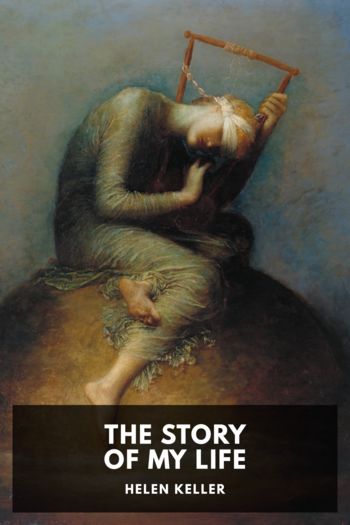The Story of My Life by Helen Keller (books to read for self improvement .TXT) 📕

- Author: Helen Keller
Book online «The Story of My Life by Helen Keller (books to read for self improvement .TXT) 📕». Author Helen Keller
Last year, my second year at Radcliffe, I studied English composition, the Bible as English composition, the governments of America and Europe, the Odes of Horace, and Latin comedy. The class in composition was the pleasantest. It was very lively. The lectures were always interesting, vivacious, witty; for the instructor, Mr. Charles Townsend Copeland, more than anyone else I have had until this year, brings before you literature in all its original freshness and power. For one short hour you are permitted to drink in the eternal beauty of the old masters without needless interpretation or exposition. You revel in their fine thoughts. You enjoy with all your soul the sweet thunder of the Old Testament, forgetting the existence of Jahweh and Elohim; and you go home feeling that you have had “a glimpse of that perfection in which spirit and form dwell in immortal harmony; truth and beauty bearing a new growth on the ancient stem of time.”
This year is the happiest because I am studying subjects that especially interest me, economics, Elizabethan literature, Shakespeare under Professor George L. Kittredge, and the History of Philosophy under Professor Josiah Royce. Through philosophy one enters with sympathy of comprehension into the traditions of remote ages and other modes of thought, which erewhile seemed alien and without reason.
But college is not the universal Athens I thought it was. There one does not meet the great and the wise face to face; one does not even feel their living touch. They are there, it is true; but they seem mummified. We must extract them from the crannied wall of learning and dissect and analyze them before we can be sure that we have a Milton or an Isaiah, and not merely a clever imitation. Many scholars forget, it seems to me, that our enjoyment of the great works of literature depends more upon the depth of our sympathy than upon our understanding. The trouble is that very few of their laborious explanations stick in the memory. The mind drops them as a branch drops its overripe fruit. It is possible to know a flower, root and stem and all, and all the processes of growth, and yet to have no appreciation of the flower fresh bathed in heaven’s dew. Again and again I ask impatiently, “Why concern myself with these explanations and hypotheses?” They fly hither and thither in my thought like blind birds beating the air with ineffectual wings. I do not mean to object to a thorough knowledge of the famous works we read. I object only to the interminable comments and bewildering criticisms that teach but one thing: there are as many opinions as there are men. But when a great scholar like Professor Kittredge interprets what the master said, it is “as if new sight were given the blind.” He brings back Shakespeare, the poet.
There are, however, times when I long to sweep away half the things I am expected to learn; for the overtaxed mind cannot enjoy the treasure it has secured at the greatest cost. It is impossible, I think, to read in one day four or five different books in different languages and treating of widely different subjects, and not lose sight of the very ends for which one reads. When one reads hurriedly and nervously, having in mind written tests and examinations, one’s brain becomes encumbered with a lot of choice bric-a-brac for which there seems to be little use. At the present time my mind is so full of heterogeneous matter that I almost despair of ever being able to put it in order. Whenever I enter the region that was the kingdom of my mind I feel like the proverbial bull in the china shop. A thousand odds and ends of knowledge come crashing about my head like hailstones, and when I try to escape them, theme-goblins and college nixies of all sorts pursue me, until I wish—oh, may I be forgiven the wicked wish!—that I might smash the idols I came to worship.
But the examinations are the chief bugbears of my college life. Although I have faced them many times and cast them down and made them bite the dust, yet they rise again and menace me with pale looks, until like Bob Acres I feel my courage oozing out at my finger ends. The days before these ordeals take place are spent in cramming your mind with mystic formula and indigestible dates—unpalatable diets, until you wish that books and science and you were buried in the depths of the sea.
At last the dreaded hour arrives, and you are a favoured being indeed if you feel prepared, and are able at the right time to call to your standard thoughts that will aid you in that supreme effort. It happens too often that your trumpet call is unheeded. It is most perplexing and exasperating that just at the moment when you need your memory and a nice sense of discrimination, these faculties take to themselves wings and fly away. The facts you have garnered with such infinite trouble invariably fail you at a pinch.
“Give a brief account of Huss and his work.” Huss? Who was he and what did he do? The name looks strangely familiar. You ransack your budget of historic facts much as you would hunt for a bit of silk in a ragbag. You are sure it is somewhere in your mind near the top—you saw it there the other day when you were looking up the beginnings of the Reformation. But where is it now? You fish out all manner of odds and ends of knowledge—revolutions, schisms, massacres,





Comments (0)